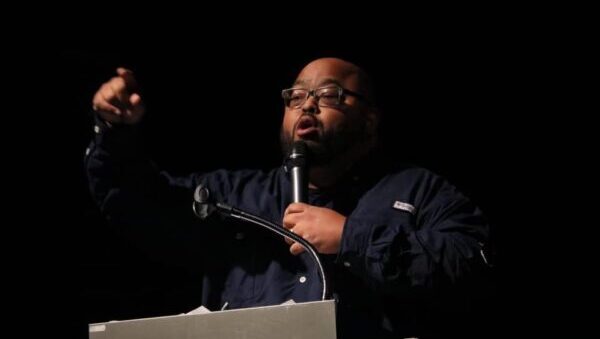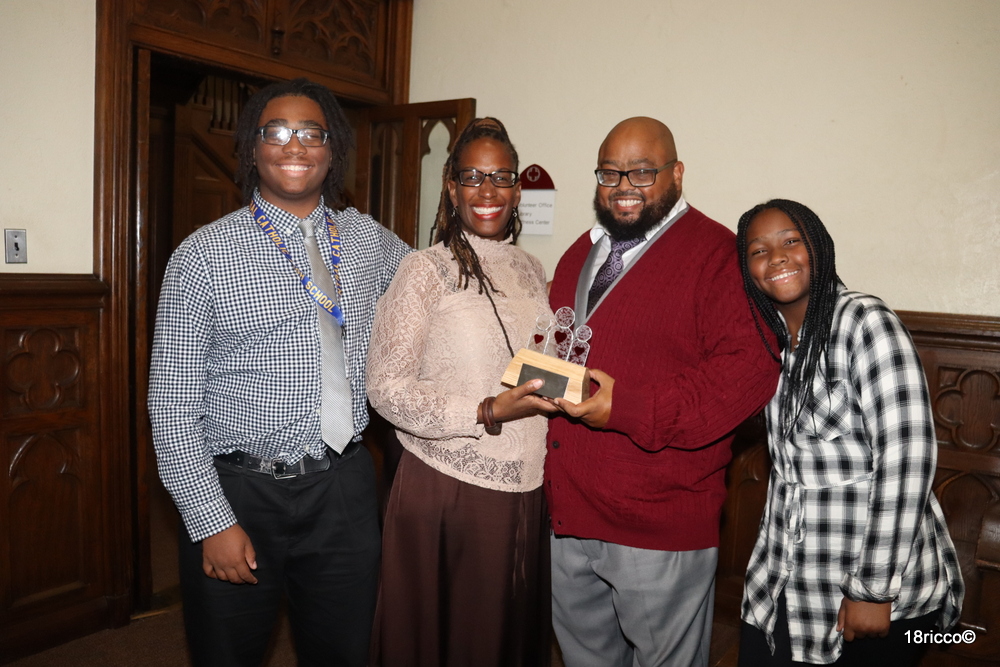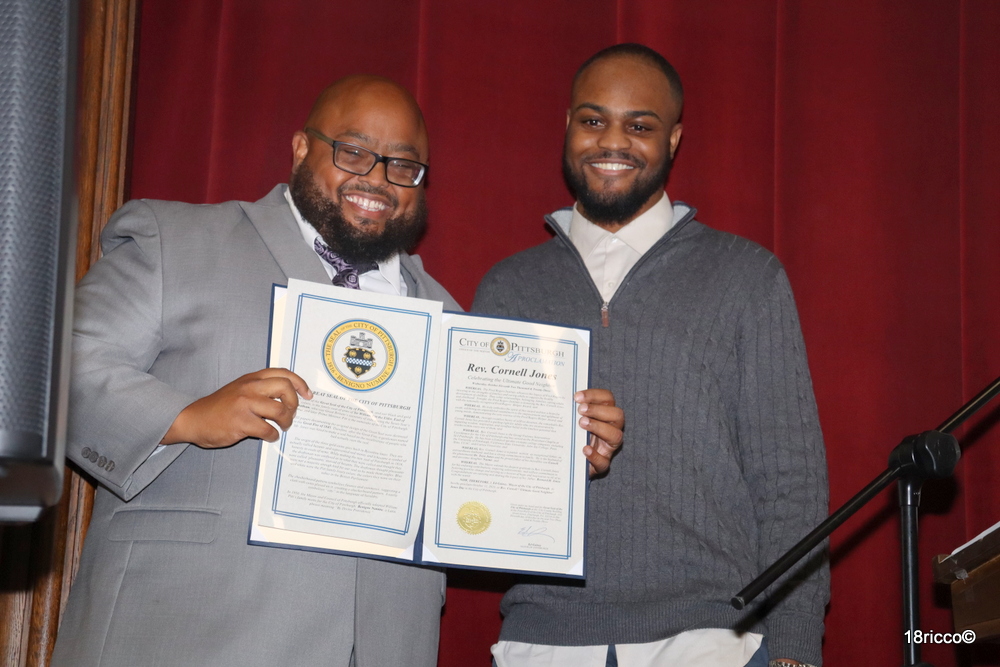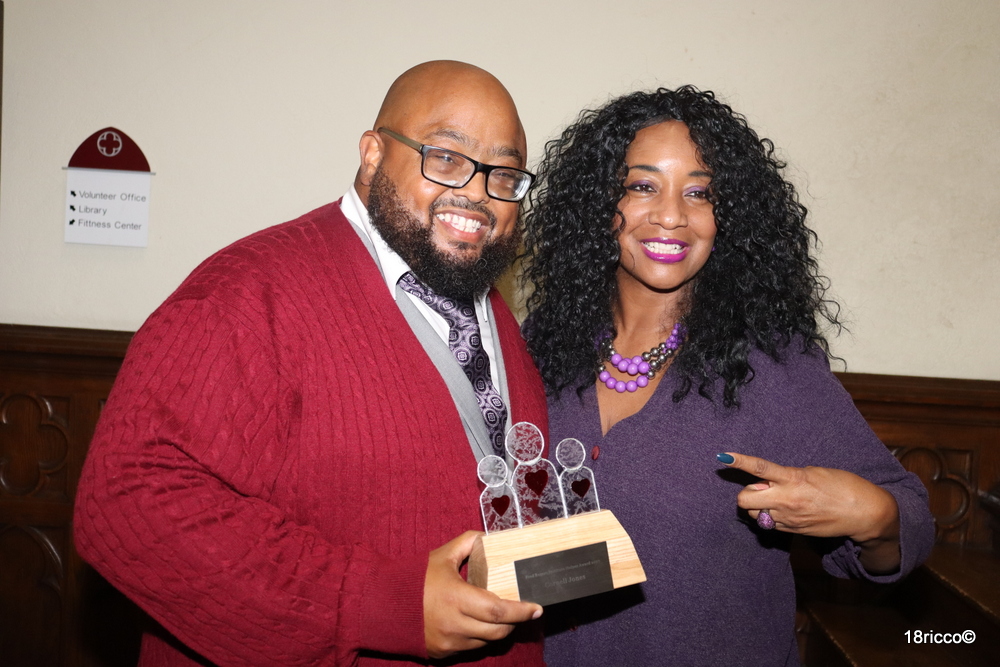
Rev. Cornell Jones Receives Inaugural Fred Rogers Institute Award
The people who everyone gives up on are the ones who I’m drawn to.’
When you do good, it seems like good always comes back to you.
Andrea Flack-Wetherald could have just let the deadline pass. She could have just turned on the TV, or scrolled through Facebook.
Instead, she was determined to fill out a number of questions and even create and submit a video about how much Rev. Cornell Jones deserves the inaugural Fred Rogers Institute Helper Award.
Flack-Wetherald, who no longer lives in Pittsburgh, described how, when she was living on the North Side, her family was dealing with gun violence in front of her home on a regular basis. Reverend Jones, the longtime community and violence prevention activist, and his outreach team intervened, and stopped a number of violence-related incidents from happening near Flack-Wetherald’s residence. Reverend Jones also provided Flack-Wetherald’s family with constant support, resources and conversation.
Reverend Jones, along with 13 others, were named recipients of the Fred Rogers Institute Helper Award, in October. The awardees live all throughout the country, meaning that out of the hundreds of people nominated, people like Rev. Jones were truly coveted by the awards selection committee.

CORNELL JONES JR., 16, DR. TOYA JONES, REV. CORNELL JONES, NAOMI JONES, 12. (PHOTOS BY J.L. MARTELLO)
In addition to Rev. Jones, 49, five others are from Pennsylvania: Tercell Wilson, director of operations and kitchen management at Earthen Vessels Outreach in Friendship; Lisa Thompson, special education paraprofessional in the Bethel Park School District; Rebecca Hutzell, elementary learning support teacher at Shanksville-Stony Creek Elementary; John Storey Jr., deputy fire chief, North Strabane Fire Department; and Marla Pettit, the founder/director of North Pittsburgh Children’s House in Gibsonia.

THE MAYOR’S OFFICE PRESENTED A PROCLAMATION TO REV. CORNELL JONES.
Wilson and Rev. Jones were the only two African Americans selected for the inaugural award.
In an exclusive interview with the New Pittsburgh Courier, Rev. Jones never thought he would win such an award, especially one named after Fred Rogers.
“Fred Rogers in Pittsburgh, he’s huge,” Rev. Jones told the Courier. “The communities love Fred Rogers…even the streets love Fred Rogers. He goes across the board.”
And he never thought what he did to help the Wetherald family would be returned in this manner.
“We became good friends, and she’s been a supporter of the work that I do,” Rev. Jones told the Courier about Flack-Wetherald. “I didn’t expect anything from it, but to her and to her children, I was like a superhero.”
The Fred Rogers Institute Helper Award was made to honor and recognize the people who care for children and communities in extraordinary ways in their daily and professional lives. The awards were launched this year, 2023, in honor of the 20th anniversary of the Fred Rogers Institute.
Fred Rogers is beloved for his tireless contributions to the betterment of young people throughout the world, whom he reached through the iconic “Mister Rogers Neighborhood” TV show, which was produced at WQED-TV in Oakland.
Reverend Jones is the son of Bernard H. Jones, the founder of the POISE Foundation and Urban Youth Action, two instrumental organizations in Pittsburgh (Urban Youth Action has since ceased operations). On the POISE Foundation website, a page is dedicated to Bernard Jones. “Early in his life Bernard gained an appreciation of, concern and compassion for the human condition, especially as lived by poor, urban youth,” is how the POISE Foundation started to describe Bernard Jones.
And Bernard Jones was Rev. Cornell Jones’ hero, too.
Pittsburghers are well aware of Rev. Jones through his ministry at local prisons, through Iron Cross Community Ministries, and he organized the first motorcycle “Ride 4 Peace,” which brought hundreds of bikers to ride in unity through Pittsburgh’s neighborhoods that were prone to homicides.
Reverend Jones, the 1993 Central Catholic High School graduate who attended Geneva College, is certified as a gang intervention specialist, violence prevention specialist, crisis intervention specialist, and taught classes on how to deal with trauma to young people at Shuman Juvenile Detention Center and in various Pittsburgh schools.
He’s currently the Director of Street Outreach for the City of Pittsburgh, and is preparing to launch a new non-profit organization, Operation Amani. Operation Amani, he said, will be a “one-stop shop for people who are caught up in the street life and people who are returning citizens from prison and the juvenile justice center.”
“Cornell Jones is an invaluable resource to the Pittsburgh Bureau of Police and the communities we serve,” said Pittsburgh Chief of Police Larry Scirotto, in a statement to the Courier. “His selfless commitment to community safety is a testament to the man he is. He is not only a man of faith, but a man of action, and he has exhibited it every day since he began working with the Bureau. Cornell embodies the spirit of Mr. Rogers, connecting with young people throughout all of our neighborhoods, helping bridge the gap between youth and police, serving as both a mentor and a partner, with the overarching goal of creating a safer Pittsburgh.”
Not everyone is cut out to be a violence prevention specialist. Some people talk about doing it, but Rev. Jones is actually doing it. He told the Courier it’s his calling.

“Loving on the people,” Rev. Jones said, is the real key to the work he does. “When you take time to just build a relationship and love on a person and help direct them, and find out things that are good about them, or things they might need…I’ve seen people totally change. A lot of times the people who are doing a lot of the (criminal) stuff are dealing with a lot of traumas. They’ve had a lot of pain in their lives and they’re angry. But I’ve found that if I take time to love on them where they’re at and not judge them, that’s been the most effective thing that has worked.”
Reverend Jones has been and continues to be a fixture in area prisons. He’s found that people who are incarcerated “always wanted to hang with me because I was speaking life, I wasn’t talking a conversation of death,” he told the Courier. Sometimes, Rev. Jones and his wife, Dr. Toya Jones, would be seen together at the prison, and inmates would be “amazed that there were two Black people in front of them that were married that was doing this type of work,” Rev. Jones said. It showed them a “powerful example” of a Black married couple “working together to build the community.”
Over all the years that Rev. Jones has been working in violence prevention, he told the Courier it was those who may be serving life in prison who taught him the most.
“The people who everyone gives up on,” Rev. Jones said, “are the ones who I’m drawn to.”
Sorry, the comment form is closed at this time.
